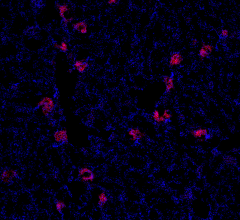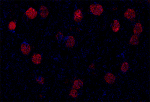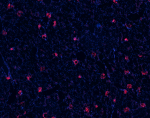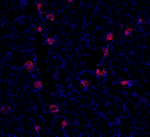- Clone
- PMab-2 (See other available formats)
- Regulatory Status
- RUO
- Other Names
- E11 antigen epitope, RTI140, T1-alpha
- Isotype
- Mouse IgG1, κ
- Ave. Rating
- Submit a Review

| Cat # | Size | Price | Quantity Check Availability | Save | ||
|---|---|---|---|---|---|---|
| 250905 | 25 µg | £121 | ||||
| 250906 | 100 µg | £217 | ||||
Podoplanin (PDPN) is a platelet aggregation-inducing factor, which is known as an endogenous ligand of C-type lectin-like receptor-2 (CLEC-2). PDPN is also expressed in several normal tissues, such as lung type I alveolar cells and kidney podocytes.
Product DetailsProduct Details
- Verified Reactivity
- Rat
- Antibody Type
- Monoclonal
- Host Species
- Mouse
- Formulation
- Phosphate-buffered solution, pH 7.2, containing 0.09% sodium azide.
- Preparation
- The antibody was purified by affinity chromatography and conjugated with Alexa Fluor® 647 under optimal conditions.
- Concentration
- 0.5 mg/ml
- Storage & Handling
- The antibody solution should be stored undiluted between 2°C and 8°C, and protected from prolonged exposure to light. Do not freeze.
- Application
-
IHC-F - Quality tested
- Recommended Usage
-
Each lot of this antibody is quality control tested by immunohistochemical staining on frozen tissue sections. For immunohistochemistry, a concentration range of 5.0 - 10 µg/ml is suggested. It is recommended that the reagent be titrated for optimal performance for each application.
* Alexa Fluor® 647 has a maximum emission of 668 nm when it is excited at 633 nm / 635 nm.
Alexa Fluor® and Pacific Blue™ are trademarks of Life Technologies Corporation.
View full statement regarding label licenses -
Application References
(PubMed link indicates BioLegend citation) -
- Oki H, et al. 2015. Monoclon Antib Immunodiagn Immunother. 34(6):396-403. (IHC)
- RRID
-
AB_2814105 (BioLegend Cat. No. 250905)
AB_2814106 (BioLegend Cat. No. 250906)
Antigen Details
- Distribution
-
Expressed on epithelial and mesothelial cells.
- Function
- Mediates effects on cell migration and adhesion through its different partners. During development plays a role in blood and lymphatic vessels separation by binding CLEC1B, triggering CLEC1B activation in platelets and leading to platelet activation and/or aggregation. Interaction with CD9, on the contrary, attenuates platelet aggregation and pulmonary metastasis induced by PDPN. Mediates effects on cell migration and adhesion through its different partners. Through MSN or EZR interaction promotes epithelial-mesenchymal transition (EMT) leading to ERZ phosphorylation and triggering RHOA activation leading to cell migration increase and invasiveness. Interaction with CD44 promotes directional cell migration in epithelial and tumor cells (By similarity). In lymph nodes (LNs), controls fibroblastic reticular cells (FRCs) adhesion to the extracellular matrix (ECM) and contraction of the actomyosin by maintaining ERM proteins (EZR; MSN and RDX) and MYL9 activation through association with unknown transmembrane proteins. Engagement of CLEC1B by PDPN promotes FRCs relaxation by blocking lateral membrane interactions leading to reduction of ERM proteins (EZR; MSN and RDX) and MYL9 activation (By similarity). Through binding with LGALS8 may participate to connection of the lymphatic endothelium to the surrounding extracellular matrix. In keratinocytes, induces changes in cell morphology showing an elongated shape, numerous membrane protrusions, major reorganization of the actin cytoskeleton, increased motility and decreased cell adhesion. Controls invadopodia stability and maturation leading to efficient degradation of the extracellular matrix (ECM) in tumor cells through modulation of RHOC activity in order to activate ROCK1/ROCK2 and LIMK1/LIMK2 and inactivation of CFL1 (By similarity). Required for normal lung cell proliferation and alveolus formation at birth (By similarity). Does not function as a water channel or as a regulator of aquaporin-type water channels (By similarity). Does not have any effect on folic acid or amino acid transport (By similarity).
- Cell Type
- Epithelial cells
- Biology Area
- Cancer Biomarkers, Cell Biology, Immunology, Neuroscience, Neuroscience Cell Markers
- Gene ID
- 117547 View all products for this Gene ID
- UniProt
- View information about Podoplanin on UniProt.org
Related FAQs
Other Formats
View All Podoplanin Reagents Request Custom Conjugation| Description | Clone | Applications |
|---|---|---|
| Purified anti-rat Podoplanin | PMab-2 | IHC-F |
| Alexa Fluor® 594 anti-rat Podoplanin | PMab-2 | IHC-F |
| Alexa Fluor® 647 anti-rat Podoplanin | PMab-2 | IHC-F |
Compare Data Across All Formats
This data display is provided for general comparisons between formats.
Your actual data may vary due to variations in samples, target cells, instruments and their settings, staining conditions, and other factors.
If you need assistance with selecting the best format contact our expert technical support team.
-
Purified anti-rat Podoplanin

Rat frozen kidney section was fixed with 4% paraformaldehyde... -
Alexa Fluor® 594 anti-rat Podoplanin

Rat frozen kidney section was fixed with 4% paraformaldehyde... -
Alexa Fluor® 647 anti-rat Podoplanin

Rat frozen kidney section was fixed with 4% paraformaldehyde...

 Login / Register
Login / Register 















Follow Us